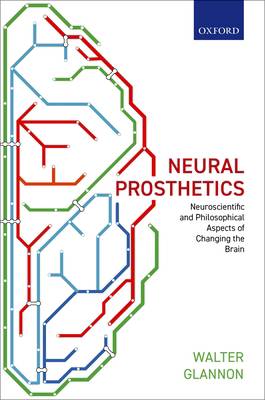
- Retrait gratuit dans votre magasin Club
- 7.000.000 titres dans notre catalogue
- Payer en toute sécurité
- Toujours un magasin près de chez vous
- Retrait gratuit dans votre magasin Club
- 7.000.0000 titres dans notre catalogue
- Payer en toute sécurité
- Toujours un magasin près de chez vous
Neural Prosthetics
Neuroscientific and Philosophical Aspects of Changing the Brain
Walter Glannon
Livre relié | Anglais
107,95 €
+ 215 points
Description
Neural prosthetics are systems or devices implanted in or connected to the brain that influence the input and output of information. They modulate, bypass, supplement, or replace regions of the brain and its connections to parts of the body that are damaged, dysfunctional, or lost, whether from congenital conditions, brain injury, limb loss, or neurodegenerative disease. Neural prosthetics can restore sensory, motor, and cognitive functions in people with these conditions and enable them to regain functional independence and improve their quality of life. This book explores the neuroscientific and philosophical implications of neural prosthetics. Neuroscientific discussion focuses on how neural prosthetics can restore brain and bodily functions to varying degrees, looking at auditory and visual prosthetics, deep brain and responsive neurostimulation, brain-computer interfaces, brain-to-brain interfaces, and memory prosthetics. Philosophical discussion then considers the degree to which people with these prosthetics can benefit from or be harmed by them. Finally, it explores how these devices and systems can lead to a better understanding of the brain-mind relation, mental causation, and agency. This is an essential volume for anyone invested in the current and future directions of neural prosthetics, including neuroscientists, neurologists, neurosurgeons, neural engineers, psychologists, and psychiatrists, as well as philosophers, bioethicists, and legal theorists.
Spécifications
Parties prenantes
- Auteur(s) :
- Editeur:
Contenu
- Nombre de pages :
- 272
- Langue:
- Anglais
Caractéristiques
- EAN:
- 9780198813910
- Date de parution :
- 31-10-21
- Format:
- Livre relié
- Format numérique:
- Genaaid
- Dimensions :
- 163 mm x 241 mm
- Poids :
- 589 g

Les avis
Nous publions uniquement les avis qui respectent les conditions requises. Consultez nos conditions pour les avis.






